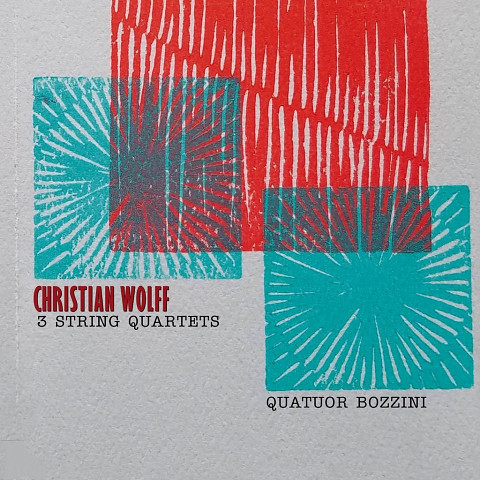It’s remarkable to realize that Christian Wolff has been creating music for over seven decades. Even more remarkable when one thinks about the range of his work. One could focus on graphic scores or text pieces like Burdocks, Edges, or Stones, his catalog of solo piano music, his music for open ensemble configurations like his Exercises series, or his activities as a performer of improvised music with musicians including Keith Rowe, Eddie Prévost, Michael Pisaro-Liu, and Antoine Beuger. And that just skirts the edges of his massive output of 250 compositions, starting in 1950 and still going strong. Wolff has benefited greatly from ongoing relationships with musicians who have performed his music regularly such as Eberhard Blum, Roland Dahinden, Philip Thomas, Robyn Schulkowsky, John Tilbury, Apartment House, as well as composers like Gordon Mumma and Frederic Rzewski.
Yet somehow, his string quartets have never quite gotten much attention. A few have appeared on previous releases, but it is remarkable that this recording by Montréal-based Quatuor Bozzini offers premiers of pieces Wolff composed in the mid-1970s, 2008, and 2019. The quartet have performed the pieces regularly for the past two decades and, in the case of the latter two compositions, the pieces were premiered by them. In his incisive liner notes, Pisaro-Liu notes that “his quartet music stems as much from Ives and Cage as from the European art music tradition. The four characters of Ives become four people playing music. In one piece he simply calls them ‘2 violinists, violist and cellist.’ Sometimes they are asked to coordinate like a traditional quartet. But at other times (often in the same piece), they are pushed to the point of dissolution. Here we find a music that allows for the spontaneous expression of four musicians who are bound together by something more than the rule of the bar line.” The three string quartets presented on this release embody these threads, embracing lyricism, political themes, open collective strategies for ensemble interaction, and compositional abstraction.
The set starts out with the three-part String Quartet Exercises out of Songs written between 1974 and 1976, a time when Wolff was grappling with how to make explicit connections between his political and social activism and his music. Like Frederic Rzewski, Wolff incorporated protest and political songs into his compositions. For the first Exercise, he drew on “Workers and Peasants are One Family,” which is a Communist adaptation of a Chinese folksong. The simple theme is stated and then gets increasingly refracted as phrases are pulled apart, broken by irregular rests which the quartet navigates with an assured sense of pacing. The way that the lyrical theme is teased apart is a study in harmonic deconstruction. The second is based on the revolutionary anthem Comintern Song by Hanns Eisler. The piece opens with a voicing of the combative theme which is then pared into a complexly structured counterpoint threaded across the ensemble. The third uses Which Side Are You On?, a song for union solidarity also used by Rzewski as the basis for a stirring piece for solo piano. Rather than starting with the theme like the previous two pieces, this one opens with a stately melodic section with ideas that move seamlessly across the instruments. A third of the way through, the theme surfaces and then gets subsumed as the piece moves further and further into fragmentation. Two thirds of the way through, the theme surfaces again, setting the stage for a languid violin solo which wends toward a rousing conclusion and restatement of the theme.
For 2 violinists, violist, and cellist, composed a decade later began as a duo for violin and cello and became a string quartet written for Quatuor Bozzini. Over the course of 34 minutes, the composition breaks down the ensemble into various configurations. The open-form structure calls on the musicians to work both independently and as a unit to navigate the piece. Wolff is quoted as saying “I prefer possible disruption and inconsequence, not so much out of affection for disorder but as a way of looking for other forms of order, fluid and flexible ones, in which the performers and the performance are what matter most, that is, what actually is done and happens can be surprising, while the players find a confidence in acting under partially indeterminate conditions.” Half-way through, a section of extended string techniques fractures into free phrases that hover with keen collective acumen. That collective triangulation across indeterminacy and structure requires both individual conviction and unwavering collective resolve. It is striking the way that all of the members of the group ride that balance throughout this knotty piece.
The nine-part Out of Kilter (String Quartet 5) from 2019 concludes the CD. Across these miniatures, ranging from 30 seconds to 3 minutes long, the quartet embraces Wolff’s penchant for bringing together divergent approaches from folk-like melodicism to microtonality to sustained harmonics and resultant overtones to ragged pizzicato, all coming together to create a variegated whole. Despite Wolff’s wry title for the piece there is nothing that is out of whack with either the overall structure of the composition or the realization captured here. Delivering a cogent performance of the piece requires a group comfortable in drawing on the vast tradition of string quartet writing without being hobbled by the conventions of that tradition. The four musicians move from section to section with a collective poise, digging into the textures, dissonances, and atmospherics of the piece to deliver an enthralling performance. At 87, Christian Wolff is showing few signs of slowing down. It’s great to have groups like Quatuor Bozzini and labels like New World Records devoted to making his music available.
